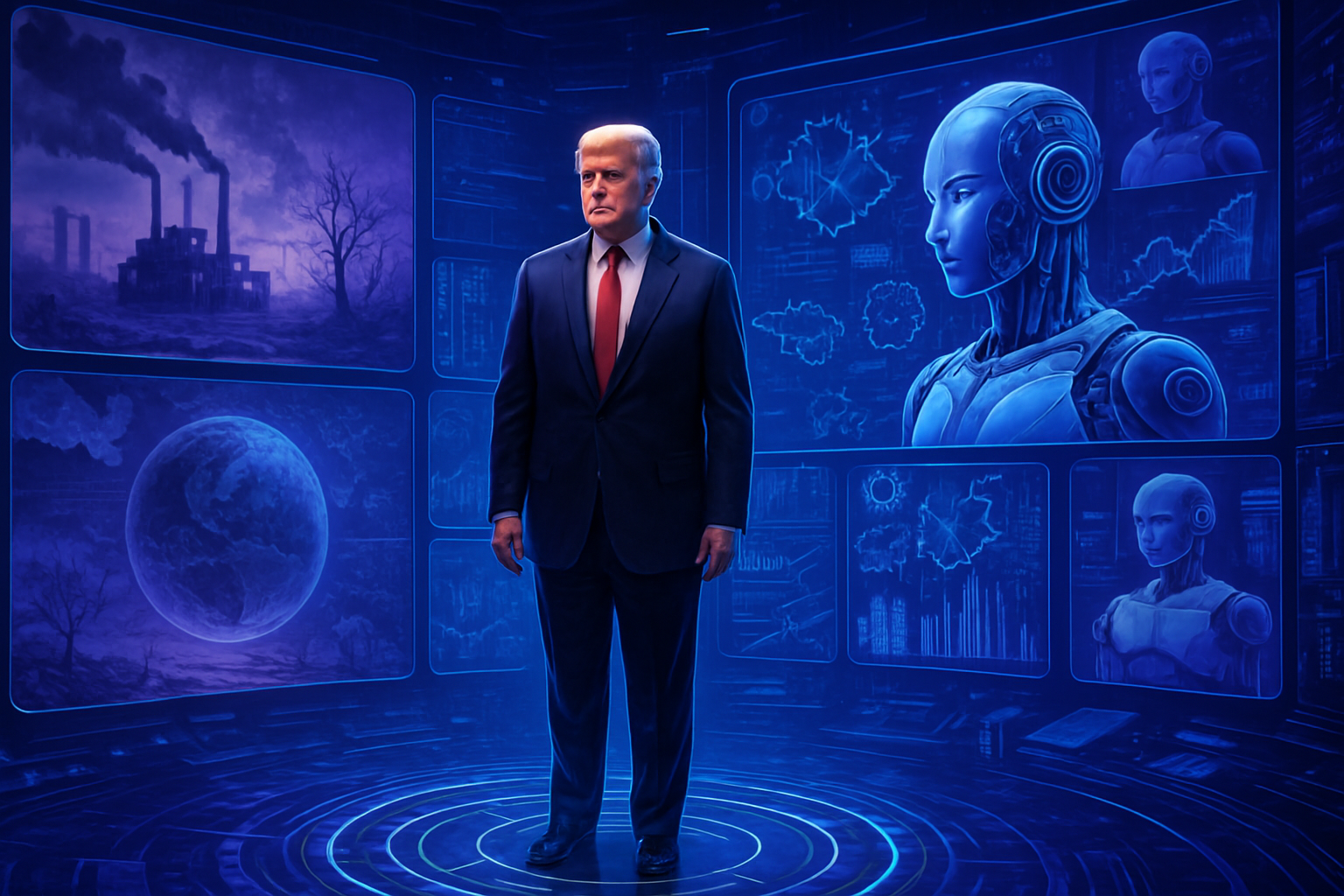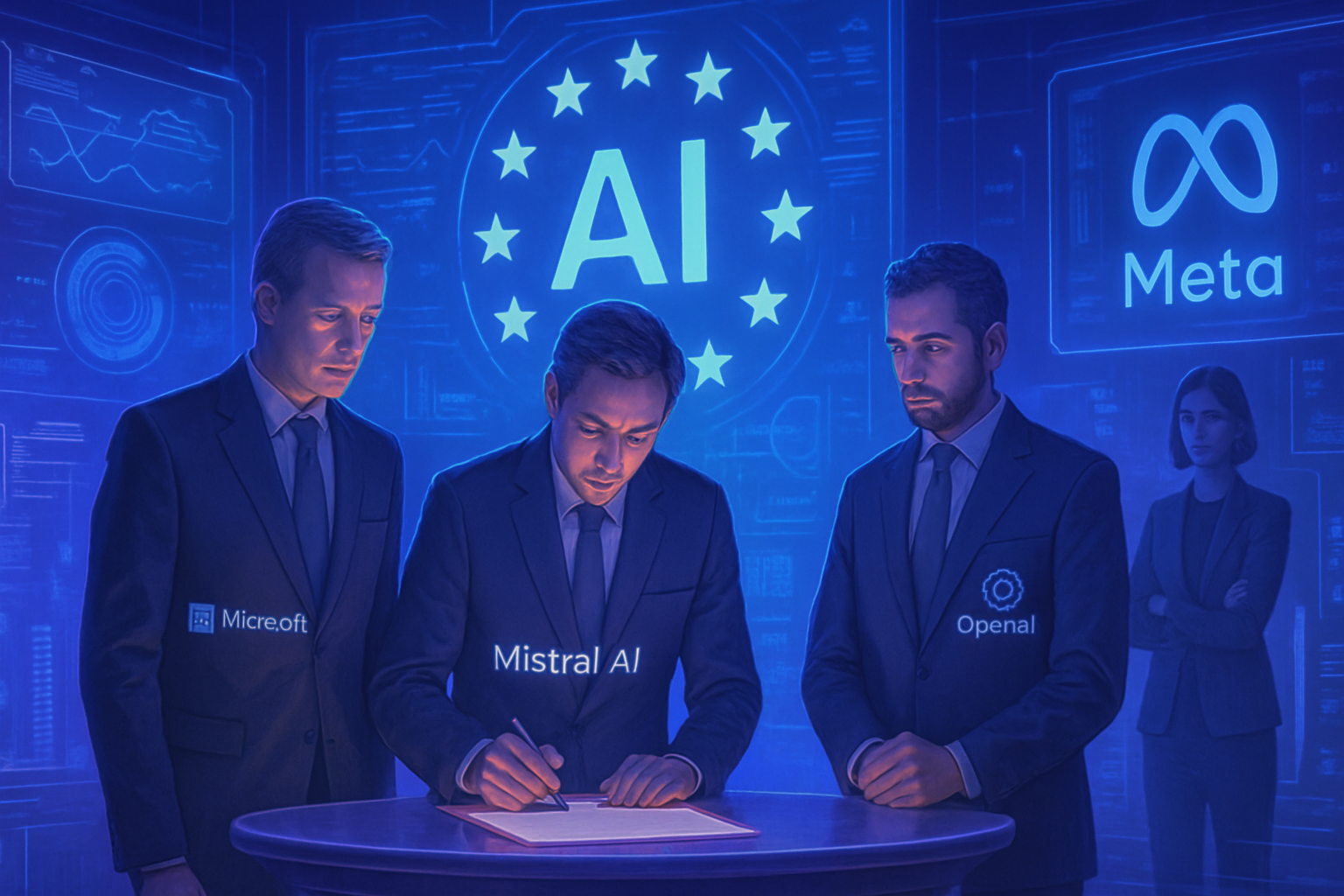The race for artificial intelligence has become a major issue in the global landscape. Donald Trump, with his new ambitious plan, seeks to reinforce the dominance of the United States in the face of China. However, controversial decisions are already emerging, disrupting the fragile ecological balance. Simplifying environmental laws risks accelerating the deployment of energy infrastructures at the expense of the global ecosystem. The priority given to fossil fuels raises questions about the sustainability of this technological initiative.
An ambitious plan for artificial intelligence
The project of Donald Trump to strengthen the position of the United States in the field of artificial intelligence (AI) harbors major stakes. Announced as part of the signing of a decree on January 23, this plan is to be detailed at an event in Washington D.C. The name of this initiative, “Winning the AI Race,” reflects the energy deployed to counter the rise of competitors such as China.
Legislative changes to accelerate development
The official document, titled “Winning the Race: America’s Action Plan for AI,” outlines several notable adjustments to environmental laws. The stated objective is to simplify all approval procedures for building data centers and energy infrastructures. The requirements imposed by the National Environmental Policy Act will be relaxed, allowing for rapid deployment of technological projects.
Environmental consequences
This project raises serious concerns among environmentalists. The priority given to fossil fuels appears worrisome in light of climate issues. The Trump administration plans to increase energy production, particularly by favoring natural gas and other polluting sources. The AI plan is thus described by some observers as a “climate bomb”, likely to cause disastrous environmental consequences.
Reactions from economic stakeholders
Large technology companies, including Google, have already expressed concerns about current energy infrastructures. In March, a statement condemned the sluggishness of authorization processes and their inadequacy to increasing needs. The Trump administration is therefore responding to these business expectations by facilitating access to construction permits for AI-related projects.
Rivalry with China
In the face of rising Chinese power, the United States is ramping up efforts to maintain its leadership in the field of AI. The president recently stated that global dominance in AI would require colossal investments in energy production. The challenge is: how to reconcile technological development with environmental preservation?
Anticipating new measures
Beyond legislative adjustments, other provisions are expected to emerge as part of this artificial intelligence plan. Drafts of decrees aimed at regulating “woke” AIs have been mentioned. Furthermore, lifting restrictions on the export of certain advanced American chips is also being considered.
Donald Trump’s plan reflects a willingness to address economic challenges while steering national strategies towards fierce technological competition. At the same time, the consequences of this approach on climate and the environment remain uncertain and concerning for many experts and activists across the globe.
Frequently asked questions about Donald Trump’s AI ambition and its environmental implications
What are the main objectives of Donald Trump’s action plan for artificial intelligence?
The plan aims to strengthen the position of the United States in the race for artificial intelligence by simplifying environmental laws to accelerate the construction of data centers and energy infrastructures.
How does Trump’s AI plan affect existing environmental policies?
This plan aims to reduce the environmental requirements established in the National Environmental Policy Act, thereby facilitating the granting of construction permits for new energy infrastructures and data centers.
What types of energy are prioritized in the AI action plan?
The plan emphasizes the development of fossil energy, particularly natural gas, to support the increasing energy needs related to AI.
Are there anticipated environmental consequences due to this plan?
Yes, it is heavily criticized for its potential to cause significant environmental damage, with experts labeling it a “climate bomb” due to its negative impacts on the climate.
What is the link between the competition with China and Trump’s AI plan?
Trump’s document acknowledges China as a major competitor in the field of AI, and it proposes measures to strengthen the American position, even if this involves ecological compromises.
How have technology companies reacted to Trump’s AI initiatives?
Many technology companies have expressed their concerns regarding the country’s energy infrastructures and have pushed for an acceleration of authorization processes to support their growth.
What other measures are being considered as part of this large AI plan?
The plan may include a decree against “woke” AIs and the lifting of restrictions on the export of advanced chips to counter Chinese power, in addition to adjustments regarding ecological policies.
Which civil society actors have criticized this plan and why?
Organizations like the Center for Biological Diversity have criticized the plan for its environmental implications, labeling it as favoring the short-term interests of technology giants at the expense of the health of the planet.
Does the AI plan include ethical or social considerations?
The document appears to focus on economic and technological aspirations, often at the expense of ethical or social considerations, particularly regarding environmental sustainability efforts.






